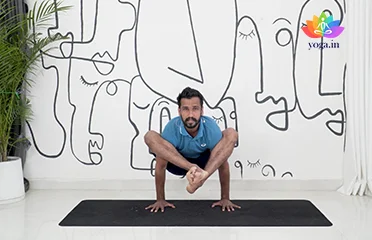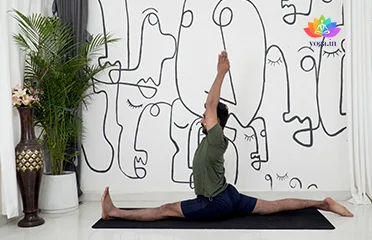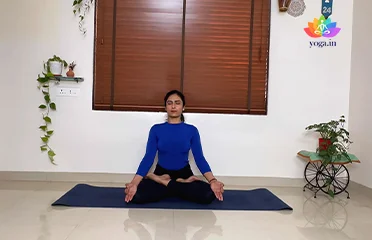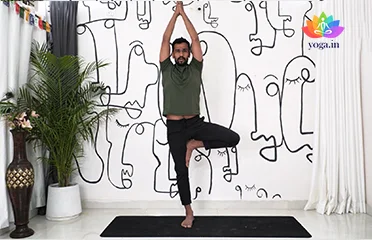Anantasana (Sleeping Vishnu Pose)
अनन्तासन / Sleeping Vishnu Pose | Vishnu's Couch Pose
The Sanskrit name is derived from Ananta (अनन्त) meaning without end [�K]
Anjaneyasana (Crescent Moon Pose)
आंजनेयासन / Crescent Moon Pose
The Sanskrit name is derived from Anjane (आंजने) meaning Hanuman, [�K]
Bhujangasana (Cobra Pose)
भुजंगासन / Cobra Pose
The Sanskrit name is derived from Bhujanga (भुजंगा) meaning cobra [�K]
Bhujapidasana (Shoulder-Pressing Pose)
भुजपीडासन / Shoulder-Pressing Pose
The Sanskrit name is derived from Bhuja (भुज) meaning arm/shoulder, Pida [�K]
Durvasasana (Sage Durvasa’s Pose)
दुर्वासासना / Sage Durvasa's Pose
The Sanskrit name is derived from the word Durva (दुर्वा) which [�K]
Hanumanasana (Monkey Pose)
हनुमानासन / Monkey Pose
The Sanskrit name is derived from the Hindu God -Hanuman (हनुमान) [�K]
Makarasana (Crocodile Pose)
मकरासन / Crocodile Pose
The Sanskrit name is derived from Makara (मकरा) meaning crocodile and [�K]
Padmasana (Lotus Pose)
पद्मासन / Lotus Pose
The Sanskrit name is derived from Padma (पद्मा) meaning lotus and [�K]
Sirsasana (Headstand)
शीर्षासन / Headstand
The Sanskrit name is derived from Sirsa (शीर्ष) meaning head and asana [�K]
Vrikshasana (Tree Pose)
वृक्षासन / Tree Pose
The Sanskrit name is derived from Vriksha (वृक्षा) meaning tree [�K]
Yoga for a Healthy Heart – A Guide to Cardiovascular Well-being
What is Cardiovascular Health & Circulatory System?
Cardiovascular health is crucial for overall well-being, as it directly impacts the circulatory system. A sedentary lifestyle and poor dietary habits often contribute to cardiovascular issues. In this guide, we will explore common symptoms, causes, and holistic approaches, such as yoga and pranayama, to promote cardiovascular health.
Symptoms of Cardiovascular Health & Circulatory System
- Fatigue and Weakness: Persistent tiredness and lack of energy.
- Shortness of Breath: Difficulty breathing or a feeling of breathlessness.
- Irregular Heartbeat: Abnormal patterns in the heart’s rhythm.
- Chest Pain or Discomfort: Unpleasant sensations or pressure in the chest area.
- Dizziness or Fainting Spells: Feeling lightheaded or experiencing sudden loss of consciousness.
Causes of Cardiovascular Health & Circulatory System
- Sedentary Lifestyle: Lack of regular physical activity or prolonged periods of inactivity.
- Unhealthy Diet High in Saturated Fats: Consuming foods with high levels of saturated fats, contributing to cardiovascular issues.
- Smoking and Excessive Alcohol Consumption: Tobacco use and excessive alcohol intake negatively impact heart and circulatory health.
- Stress and Lack of Sleep: Chronic stress and insufficient sleep affecting overall cardiovascular well-being.
- Genetics and Family History: Inherited factors and family predisposition influencing the risk of cardiovascular problems.
How Yoga and Pranayama can help
Yoga, with its gentle yet effective practices, can significantly contribute to cardiovascular health.
Benefits of Yoga Asanas:
- Improved Blood Circulation: Yoga poses like Uttanasana and Tadasana enhance blood flow, reducing strain on the heart and promoting overall cardiovascular efficiency.
- Stress Reduction: Practices such as Savasana and gentle stretching poses release tension, reducing stress levels and indirectly benefiting the circulatory system.
Benefits of Pranayama:
- Deep Relaxation: Controlled breathing in pranayama, particularly Nadi Shodhana, induces a relaxation response, promoting better heart health.
- Oxygenation: Pranayama techniques ensure optimal oxygen intake, enhancing the blood’s oxygen-carrying capacity.
Diet for Cardiovascular Health & Circulatory System:
- Emphasize fruits, vegetables, and whole grains.
- Choose lean protein sources like fish and legumes.
- Limit saturated and trans fats.
- Include heart-healthy fats from sources like nuts and olive oil.
- Control salt intake to maintain healthy blood pressure levels.
Caution for Cardiovascular Health & Circulatory System:
- Avoid excessive caffeine intake.
- Manage stress through relaxation techniques.
- Maintain a healthy weight through a balanced diet and regular exercise.
- Monitor cholesterol levels regularly.
- Stay hydrated to support overall circulatory function.
Contraindications:
- Individuals with severe heart conditions.
- Those with uncontrolled high blood pressure.
- Recent heart attack or surgery patients.
- Pregnant women (specific poses).
- Individuals with certain respiratory conditions.
It is important to understand that integrating yoga, pranayama, and a heart-healthy diet can significantly contribute to maintaining cardiovascular health. It is crucial to approach these practices mindfully, considering individual health conditions and consulting a healthcare professional when needed. By adopting a holistic approach, one can pave the way for a stronger, healthier heart and circulatory system.











